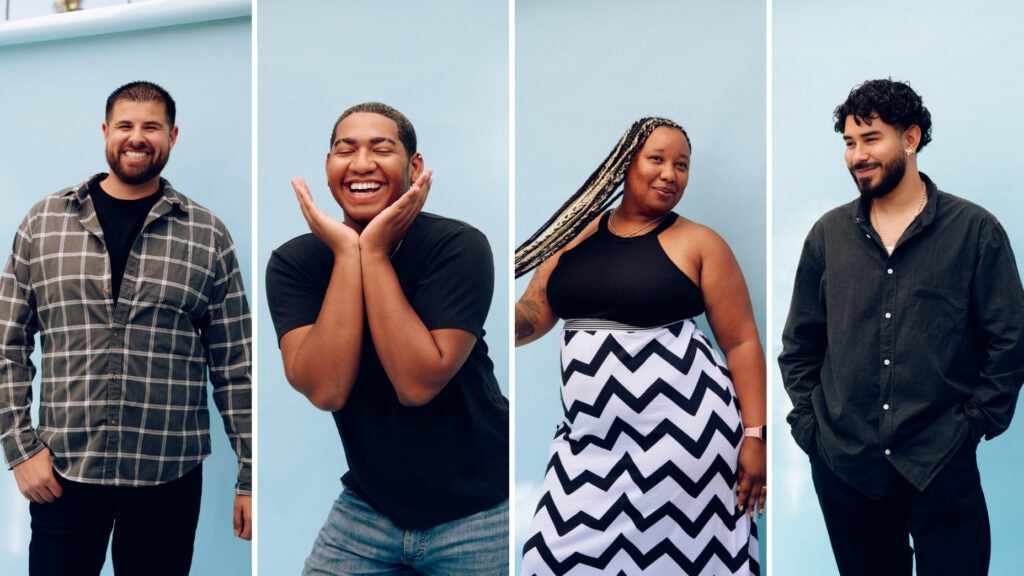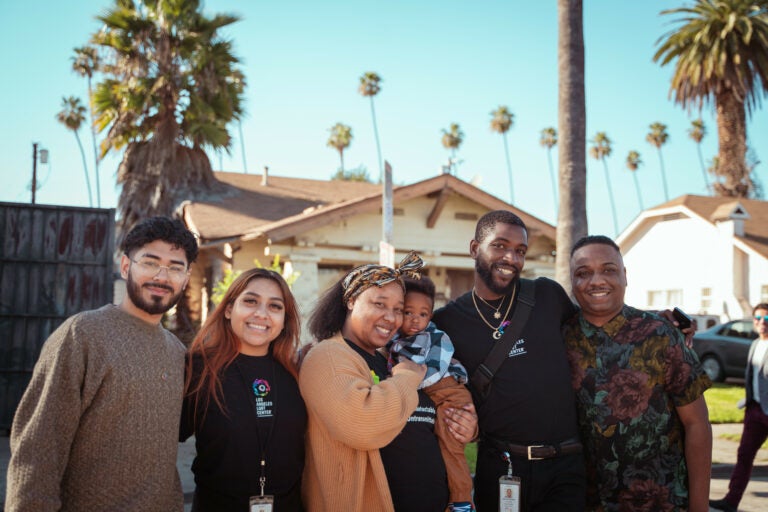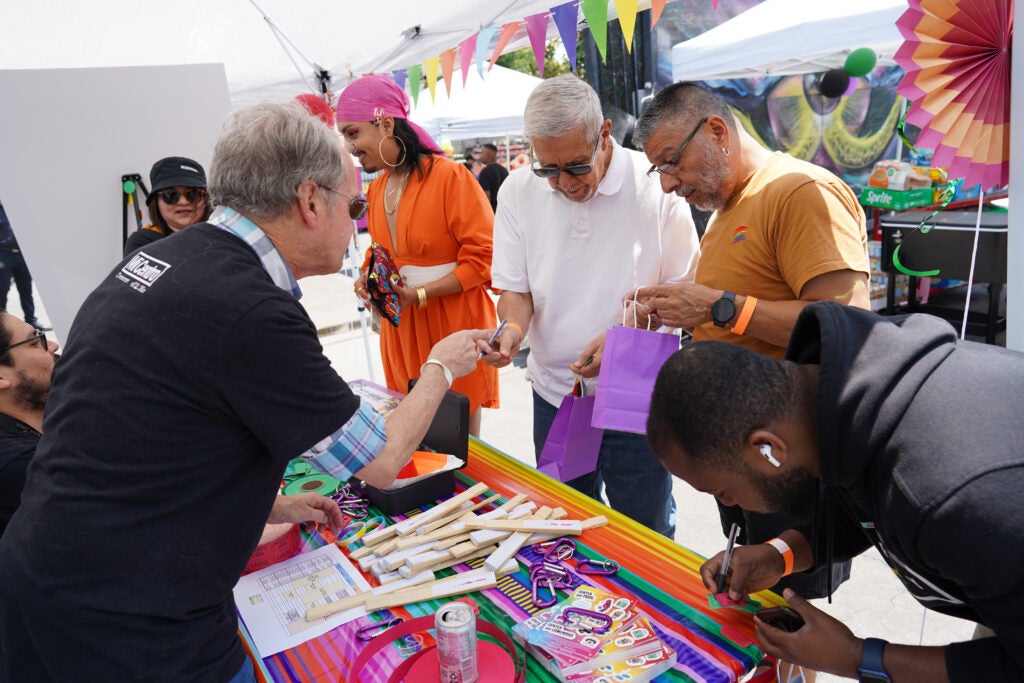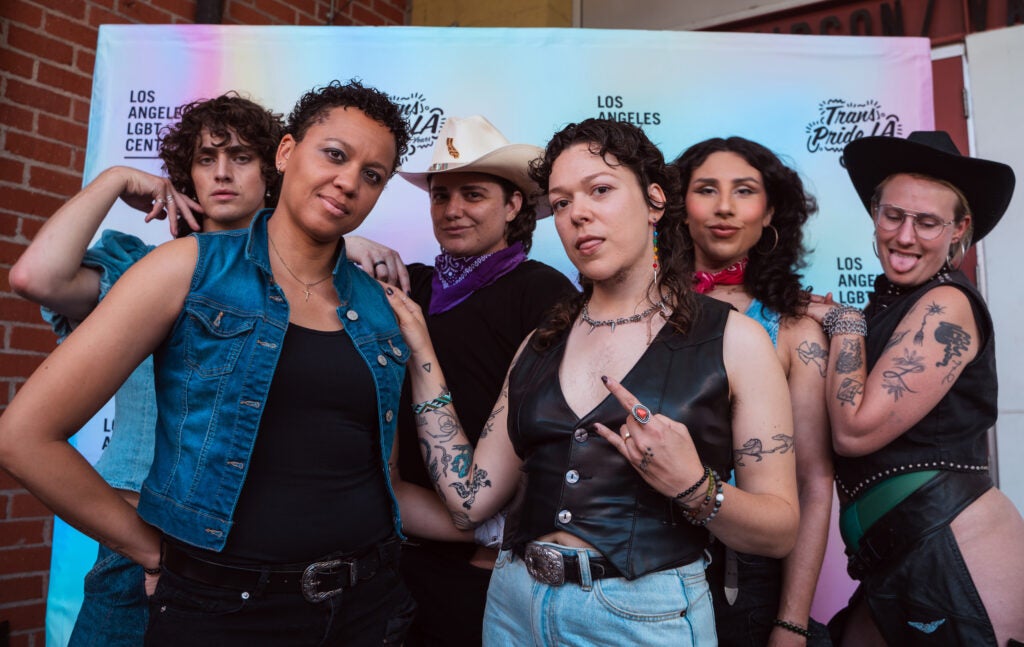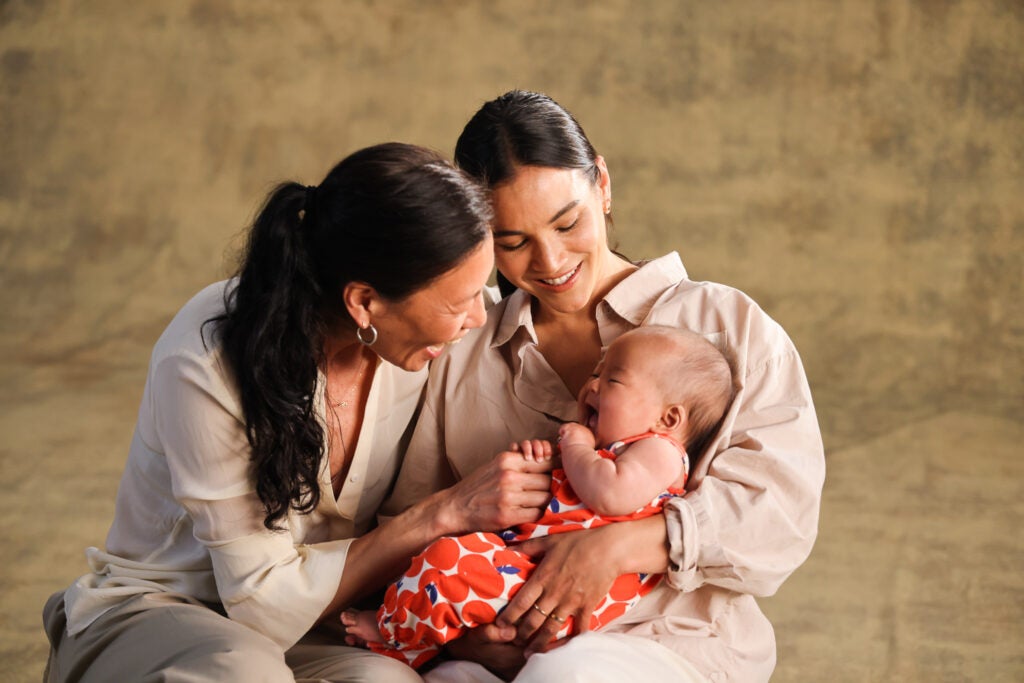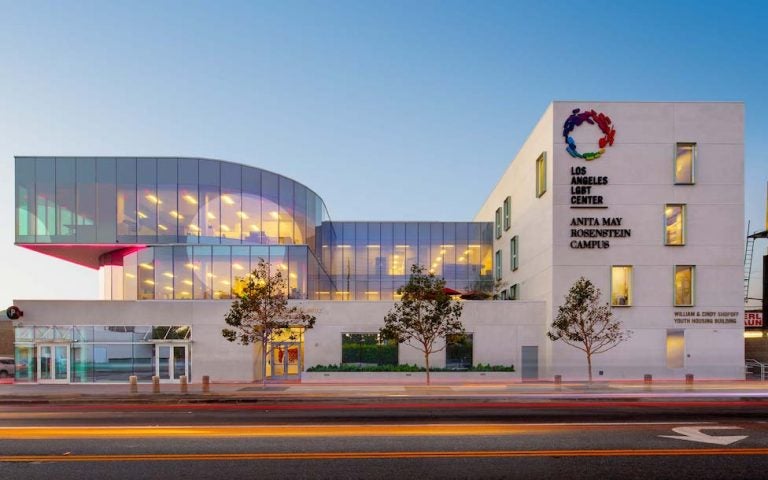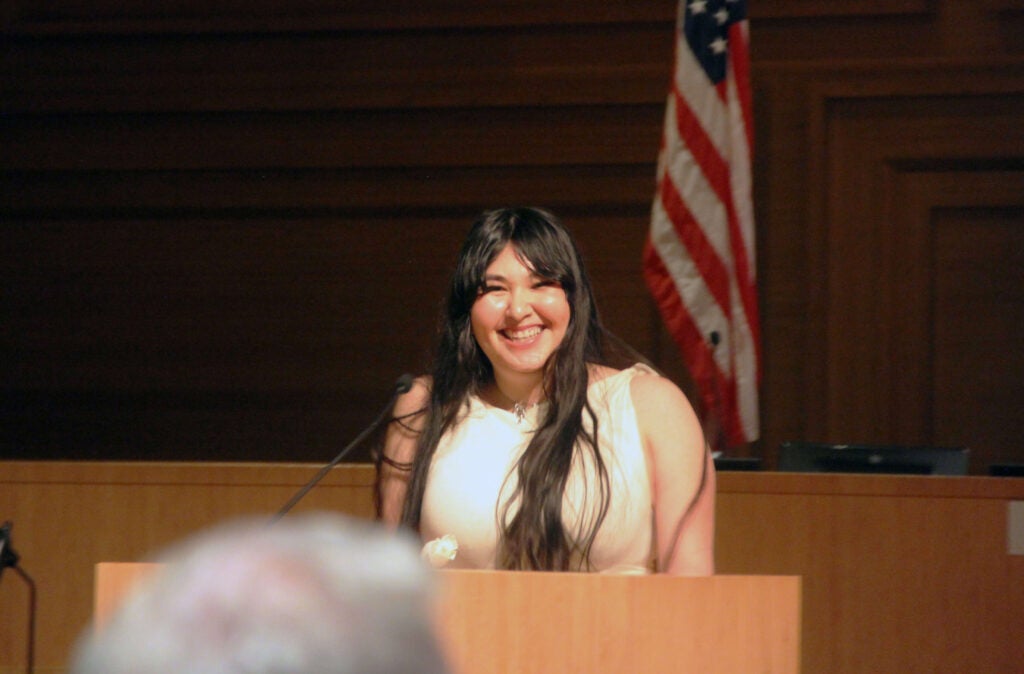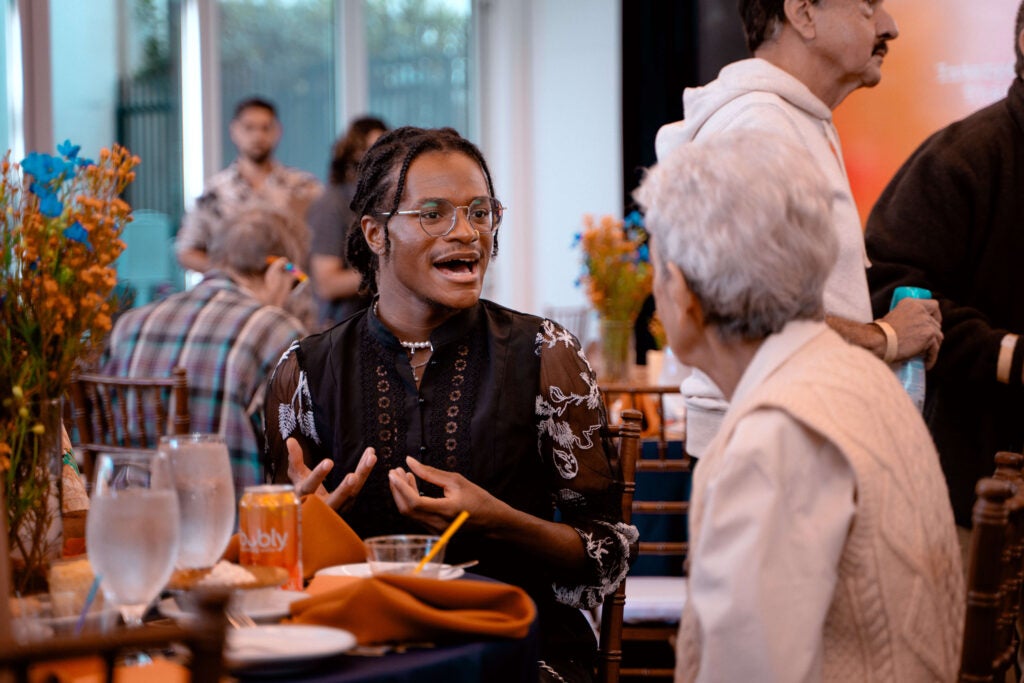Pride season in Los Angeles is typically dominated by legacy celebrations in Hollywood and West Hollywood, but on Saturday, July 13, residents and neighbors of South Los Angeles will show off their own Pride with a day of music, love, and unity.
Predominantly made up of Black and brown communities, South Los Angeles has long been overlooked—not only by Pride organizers, but by community organizations and service providers as well. The Los Angeles LGBT Center’s community center in the area, Center South, has spent the last four years working to change that, by offering grocery distribution, HIV testing, and more.
Part of that effort includes supporting this year’s South LA Pride, which boasts food, shopping, live performances, and the Outside Kiki Ball (presented by the Center), a colorful and lively parade featuring local organizations, community groups, and allies marching in support of LGBTQ+ rights.
Below, Center South staff explain what makes this community so special and share what South LA Pride means to them.
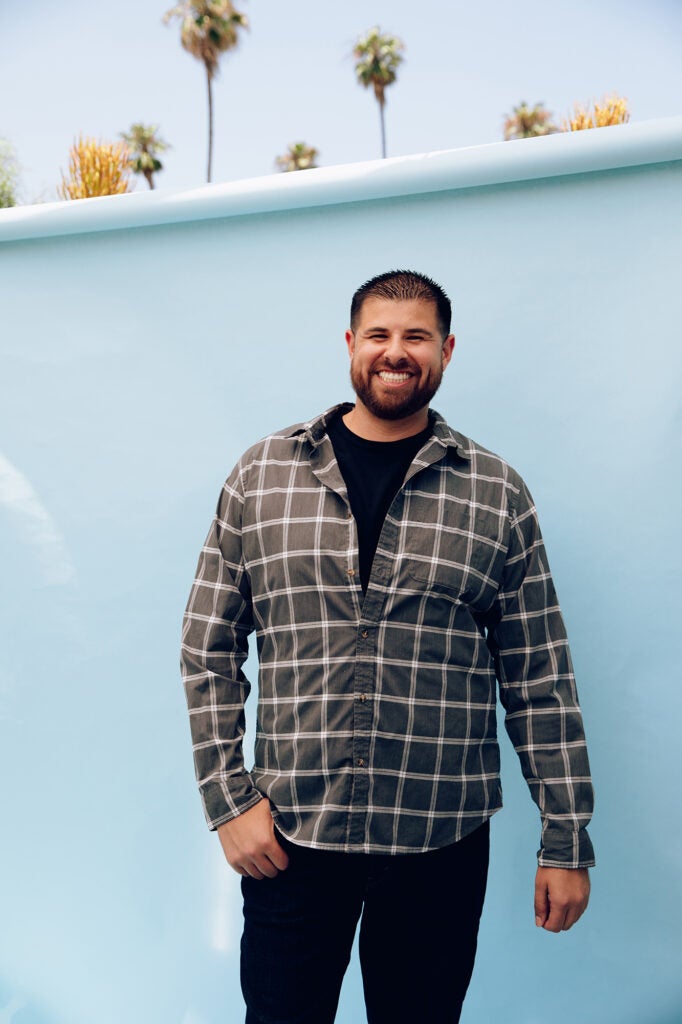
Steven Campa
Senior Program Manager
How long have you been at Center South?
Last week was actually my six-year anniversary here with the Center. I worked in Hollywood for about two years out of the Las Palmas site, then I became one of the first employees here at Center South.
Can you share a little about the work you do?
I oversee three HIV prevention and education programs. All of them specifically target men and people of color within South Los Angeles. We recently switched to diversify the population that Center South serves. Even though the programs are housed here and cater to a specific demographic, those aren’t the only folks coming in to access our services. So, we’re looking at ways to bring the work we’re doing—our clothing closet, farmers market, computer lab—to the whole community.
We started our grocery distribution with about 25 dry food boxes and grocery bags for the community—now we’re up to 125. We’re constantly growing, and we’ve been surprised by how much the community needed us. Being the Los Angeles LGBT Center, we weren’t sure how folks in South LA—which is so different from Hollywood and West Hollywood—would react. So we made sure to be present but not make folks feel uncomfortable coming into our space. We made sure to meet them where they were at, and the community has been very receptive.
What are some things that are special or unique about South LA compared to other parts of LA?
I think it’s the folks here. The community is so close-knit, and people know each other. A few years ago, we did an event at the park up the street, and everyone knew about it through word of mouth. There are so many different walks of life within the community, with all ages and demographics.
What does “South LA Pride” feel like to you?
It’s a different approach to life, rooted in the way people in this community live. People in these spaces understand that not everybody is at the same place in their journey. People coming to South LA Pride understand that some folks might not be in a place other people expect them to be. I think about this person—a young queer person in this community—who used to come to Center South a few times a week but wasn’t out to his family. He didn’t know exactly how to identify or express himself, but he came with us to Pride last year in this full-on rainbow outfit. That’s what I mean; you may not know where you’re at in your journey, but we’re going to respect that.

Menty Ayalew
Site Manager
How long have you been at Center South?
I’ve been with Center South for a little over two years. When I first got here, it was much a smaller team, but there’s been a lot of expansion recently. It’s definitely been a roller coaster but a fun one.
Can you share a little about the work you do?
I oversee all of the clinical, mental health, primary care, STI testing, rapid HIV testing components of this site, in collaboration with the program side, led by Steven. This work, at least for me, really has a sense of purpose. Every single day, we are having an impact on someone’s life, big or small. Especially here, we often see people from the community come in and say, “I’m not LGBT, but can you help me?” And a lot of the time we can. I think that’s so important.
Are there any interactions you’ve had with members of this community that really stick with you?
For me, it’s whenever folks come in and they’re just like, “I was just told to come here because I identify as LGBTQ+.” A lot of the time, they’re not asked any further questions about what they need or what they’re looking for. People just hear LGBTQ+ and send them here. So, when they walk through our doors and tell us about their needs—whether it’s immigration assistance or HIV care—I think those are the moments that always stick with me. Someone tried to pigeonhole them based on their identity, but once they’re here, we see them as a whole person and are able to get them the care they need.
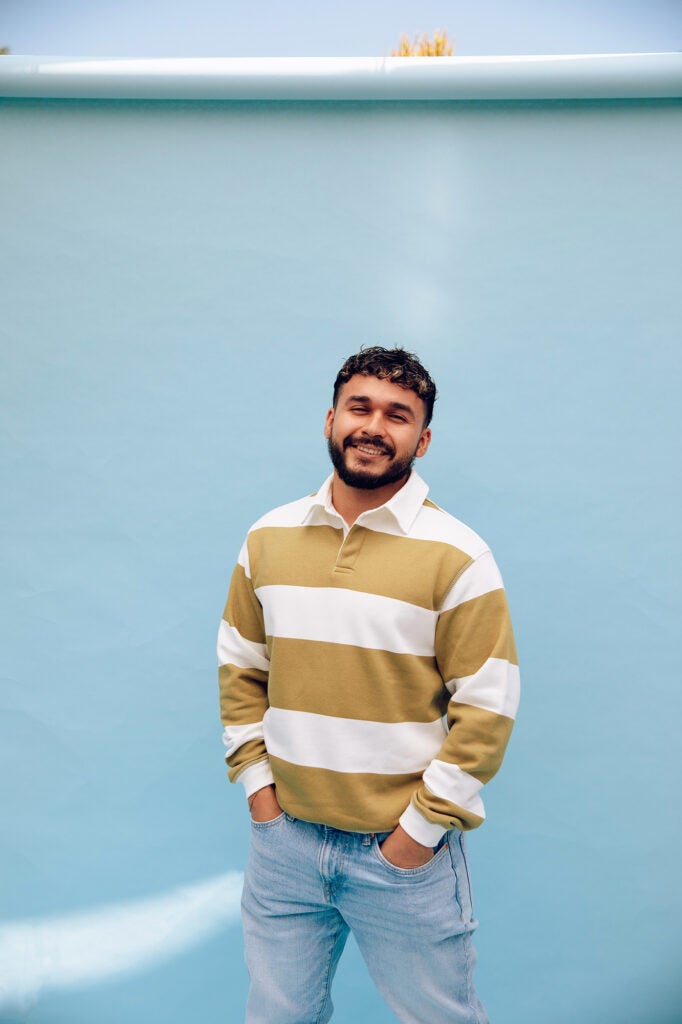
Irvin Jerez
Outreach Supervisor
How long have you been at Center South?
I started here in May 2022. One day, I was going to the Crenshaw mall to get some food after some devastating news at my previous job, and I saw the sign outside. I saw “Los Angeles LGBT Center,” and I thought it was so crazy to have that type of space here in South LA. I grew up here, and we never had that type of space. So that same day, I went back home, looked up what opportunities there were, and I’ve been just thriving ever since.
What are some things that are special or unique about South LA compared to other parts of LA?
As someone who grew up here, I often feel like people outside of the community look down on this space, or have certain ideas about the people in this community, what they can achieve and what they can’t achieve. There’s so much here that other people are just missing out on. There’s so much culture, so much love and community.
What are you most looking forward to from South LA Pride?
My favorite thing every year is just seeing queer joy. Honestly, full-heartedly, that’s my answer. Just being able to see folks from this community have the space to freely express themselves. A lot of people don’t have access to that on a normal everyday basis. So that’s always my favorite thing about Pride season, having this very intentional space for the LGBTQ+ community to come together, have a good time, and be free.

Brandon Silva Flores
Program Supervisor
How long have you been at Center South?
I’ve been with the Center since 2021, and I love it. I feel like my work serves a purpose. Every day that I come in, I’m making a change. I’m from South Central; I’ve grown up here since I was one. It’s so rewarding to be at a place where I’m giving back to my own community.
What are some things that are special or unique about South LA compared to other parts of LA?
Just being able to grow up in my community with Latino and Black individuals who share similar paths and similar histories. Growing up and seeing the struggles that we face day-to-day as people of color, and now being able to find a path that enables me to give back in whatever ways I can, is just so rewarding. It even motivated me to go back to school. I had dropped out a couple years back, and this job led me back to it. I’m studying public health so I can keep bringing funding to the community and keep giving back.

Cynthia Olmos
Outreach Specialist
How long have you been at Center South?
I started working at the Center a little over a year ago. Before, I was doing more HIV testing and counseling for clients who come in to get tested, but now I’m more on the programming side of things. I host our weekly MOCHA—Men of Color for Healthier Alliances—mixer, which is one of our social groups. I also facilitate the Goddess Circle, which is for women specifically here in South LA.
Are there any interactions you’ve had with members of this community that really stick with you?
As a counselor, I had a client who came in to get tested for HIV for the first time. As their counselor, I was, really, the first person they opened up to about their health concerns and sexual behaviors—really personal stuff that they hadn’t shared with anyone before. It really showed how important it is to have this Center here in the community. Maybe people come in just for testing, but once they’re here they see all these other ways we can help.
What does “South LA Pride” feel like to you?
Community. That’s what first comes to mind. South LA represents a lot of little neighborhoods and communities, but Pride really means bringing people together and embracing all of us as we are. It’s showing others that it’s okay to be your genuine self and be celebrated for that.
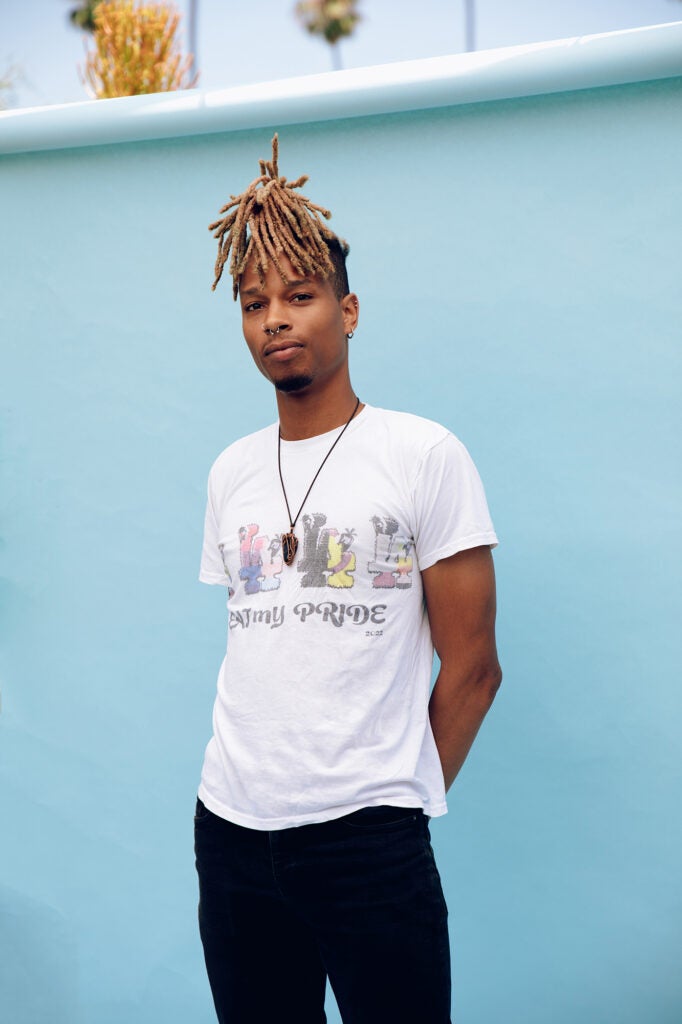
Kidron Fellows
Program Coordinator/Outreach Specialist
How long have you been at Center South?
I actually just reached five years. I started off in West Hollywood as an HIV tester, and then I transferred here to South LA when they first opened. Eventually, an opportunity came in to be a coordinator and I was just like, “Okay, let’s give that a try.” I’ve been a coordinator for the past three years, and we’re loving life.
What are some things that are special or unique about South LA compared to other parts of LA?
Well, all of LA is so special to be sure, but this community has an amazing sense of resilience. In the past four years I’ve been at this location, I’ve seen a lot of people grow and overcome a lot—dealing with homelessness, losing a job, or feeling isolated. The one thing that always stands out is that this is only the start of them finding their sense of community, taking charge of their health, and getting linked to mental health services.
What does “South LA Pride” feel like to you?
I would say “community.” That’s the main word that comes to mind. It’s the community coming together in unity. Just having a Pride event here in the first place is a big step and a big statement. It’s showing that the community here that we’re all accepted. That’s what it feels like to me.
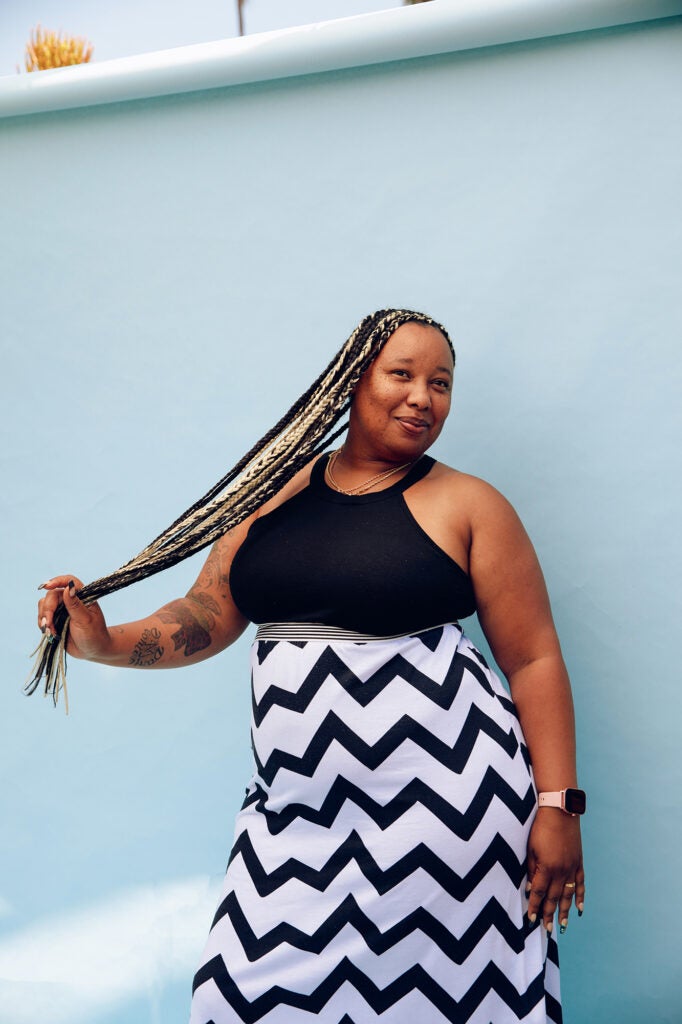
Arlene Stevenson
Program Coordinator
How long have you been at Center South?
It is going to be eight years at the Center this month. I actually started as a security guard, and I worked my way up. I worked the front desk for Health Services in Hollywood and behind-the-scenes doing the phones for a long time. I spent a lot of time in Mental Health Services, and that was so eye-opening to see the impact that has on people. Then, I moved on and got certified to do HIV testing and ended up here.
It felt like the people who work for the Center weren’t just doing this for a paycheck. We’re doing this to help somebody like us, filling those gaps where we didn’t have support. This is the first job that I’ve ever actually worked out where everybody was genuinely happy to come to work and serve their community. We’ve been the people who needed help, so we know how to extend that help.
What are some things that are special or unique about South LA compared to other parts of LA?
I live in this neighborhood. My son goes to school in this neighborhood. He has his daycare in this neighborhood. A lot of my family is in this area. A lot of my family who are LGBTQ+ are in this area. It’s very heartwarming to let them know, “Hey, you don’t have to make it all the way out to Hollywood to get services.” We’ve had people who come in, and when they leave they have a different respect for not only the community and this location.
What does “South LA Pride” feel like to you?
It feels amazing, because I feel like it’s long overdue. There are LGBTQ+ people everywhere, but we’ve always had to travel somewhere else to be involved. So to have a spotlight here and to show that we’re celebrated around here as well is an amazing experience. You don’t have to make it to Hollywood or to Long Beach, you can be celebrated in your own backyard. It’s an amazing thing. It’s like coming out to family, and they’re giving you that embrace.
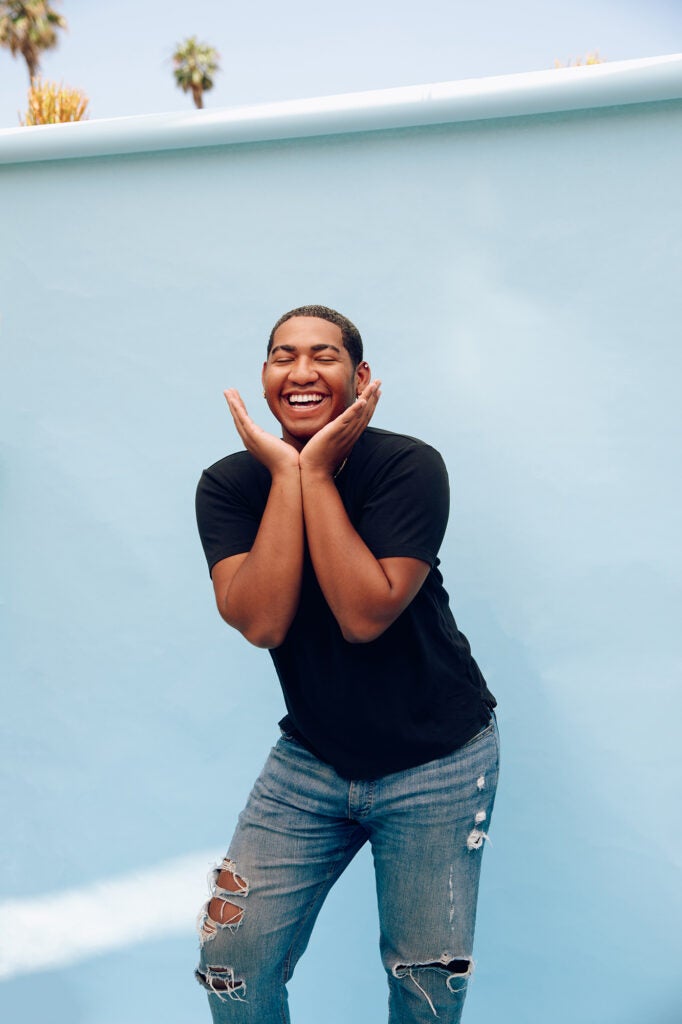
Darren Daniels-Stokes
Linkage to Care Specialist
How long have you been at Center South?
10 months, and it’s been a dream come true.
Can you share a little about the work you do?
Day-to-day, I’m talking to clients who want to transfer their care back to the Center or are coming to the Center for the first time. I assist with scheduling their appointments, and sometimes chat with patients who test positive for HIV about what it means to be positive and make sure we get them into care. Besides that, I also co-host a group called Shades of Community and a weekly HIV-positive group called Positive Vibes.
I think back to when I was first diagnosed and trying to get into care. Luckily, I was able to get in to see a doctor with no issues, so it’s amazing to get to be that hand for others. It’s full-circle for me.
What are some things that are special or unique about South LA compared to other parts of LA?
There’s no place like it. I’m from here, a little bit deeper into South Central. Tourists come to LA to see Hollywood or Santa Monica, but I always say, if you want to experience the real LA, you’ve got to come to the ghetto. You can experience literally all cultures living together in South LA. There are so many hidden pockets with these really vibrant communities. It’s a wonderland.

Rachel Gomez
Clinic Liaison
How long have you been at Center South?
Almost four months, so I’m still pretty new. But it’s been great. Everybody is so welcoming here. It’s a great environment. Everyone is welcome no matter who you are—staff or clients. I really love being part of the Center and that atmosphere.
What are some things that are special or unique about South LA compared to other parts of LA?
This is home to me. I love this place so much. A lot of us are lower income and don’t have transportation to get to Hollywood to access the Center’s services. I’m just so grateful that people here have their own space in our community to get those same opportunities. You hear a lot of bad things about our community, but there’s so much more good. A lot of people don’t understand that. Living here, you see how much community means to the people in this area.
What does “South LA Pride” feel like to you?
It feels like having a home and a family where we all can come together just to have fun. I feel like I don’t have any other way to explain it. It’s just home.
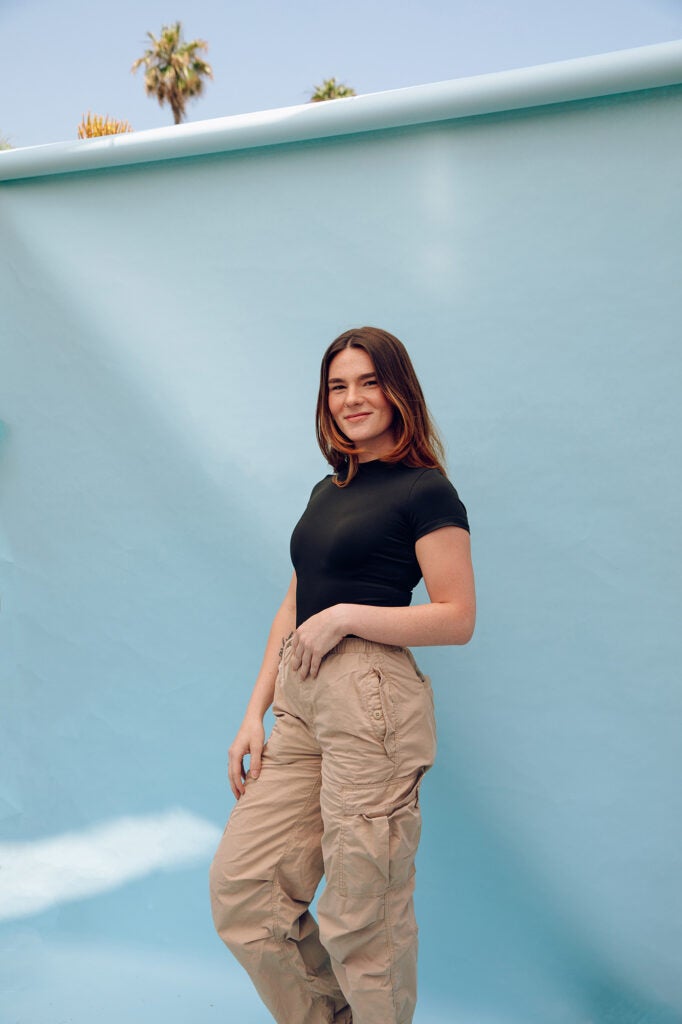
Luna Fiumara
Health Education Specialist
How long have you been at Center South?
I actually started here in January, so I’m still fairly new. But it’s been a good tradition, coming from Florida.
Are there any interactions you’ve had with members of this community that really stick with you?
A huge part of my job is working the sexual health hotline, so I field a lot of incoming calls from people looking to get advice or assistance, and it’s been super rewarding to be able to offer help. I recently had a call from someone who disclosed that they were sexually assaulted, and I was so glad to be able to help them through such a hard time of their life.
What does “South LA Pride” feel like to you?
I would say resilience, for sure. It’s definitely like a different demographic here than in the rest of LA, and this community definitely faces a unique set of challenges. Having the resilience to step out and be yourself and be open is so beautiful.

Tracy Jemison
Patient Services Specialist
How long have you been at Center South?
I started here in June of last year, so it’s been just about a year so far. I like getting to be that first impression, the friendly face that people encounter first when they walk through the door. I get to provide that calm, reassuring interaction for that person and get them set up for treatment or whatever they need. Sometimes people feel uncomfortable asking for what they need, and I get to be the one to make them feel at home.
What does “South LA Pride” feel like to you?
There’s a sense of being in community that I love about Pride. I think it’s so important to be seen, because we know there are people who do not feel safe coming out. So I love being part of that very loud, very public celebration of who we are. For me, that just inspires a really deep feeling of community that I look forward to every year.
Photos by Max Hemphill.
